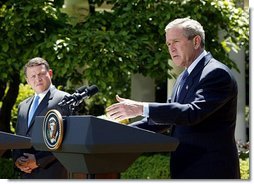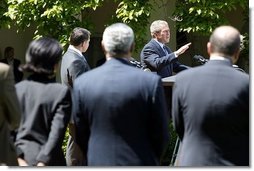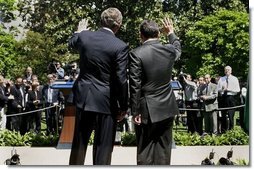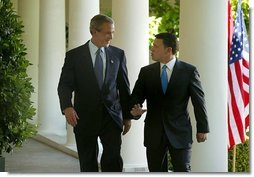
 |
For Immediate Release
Office of the Press Secretary
May 6, 2004
President Bush, Jordanian King Discuss Iraq, Middle East
Remarks by President Bush and His Majesty King Abdullah II of the Hashemite Kingdom of Jordan in a Press Availability
The Rose Garden
|
|||||
2:03 P.M. EDT
PRESIDENT BUSH: Your Majesty, welcome once again to the White House. I appreciate your friendship, and I appreciate the opportunity to hear your thoughts on a range of issues that face your country, and mine, at this time of challenge and opportunity in the Middle East.
The economic relationship between our two countries has never been stronger. We continue to increase the ties of trade and investment, creating new opportunities for both our people. The free trade agreement between Jordan and the United States is a model for the region, as my government works to build a Middle East free trade agreement.
 The United States is committed to helping Jordan along the path to
prosperity through our strong support of the World Bank and the
International Monetary Fund. And we're proud to support Jordan through
our support for Jordan's social and economic transformation program.
The United States is committed to helping Jordan along the path to
prosperity through our strong support of the World Bank and the
International Monetary Fund. And we're proud to support Jordan through
our support for Jordan's social and economic transformation program.
His Majesty and his team are reform-minded individuals who care deeply about the citizens of the Kingdom of Jordan. We spent quite a deal of time -- quite a bit of time talking about lasting prosperity in Jordan, and our desire to help Jordan achieve lasting prosperity. We also know that lasting prosperity requires lasting security and peace in the region. Our two countries are working closely to ensure that the Middle East becomes safer and more prosperous and more free.
The fall of Saddam Hussein removed a source of instability and intimidation from the heart of the Middle East. All of Iraq's neighbors, including Jordan, are safer now. And the emergence of a peaceful, prosperous, and free Iraq will contribute to Jordan's security and prosperity.
The United States strongly supports the efforts of U.N. Security General's Special Advisor Brahimi to work with Iraqis to develop and interim government. His Majesty and I talked about the fact that on June 30th, a sovereign Iraqi government will take office. Our coalition partners will continue to work with the United Nations to prepare for nationwide elections that will choose a new government in January of 2005.
Jordan and the United States share a vision for a free, stable, and prosperous Middle East. Under the King's leadership, Jordan has become a force for reform and positive change in the region. This month, Jordan will be hosting a meeting of the World Economic Forum, another important milestone on the Middle East journey to greater openness and opportunity and liberty. Next June, G8 nations will discuss ways that we can support reform in the Middle East.
We will look to the results of your World Economic Forum, Your Majesty, as a guide for future actions.
His Majesty and I also discussed our ongoing quest for a just and durable peace between Israel and Palestine. I commend the King's personal commitment to peace and justice for all parties. I remain committed to the vision I laid out here in the Rose Garden on June 24, 2002, of two states, Israel and Palestine, living side-by-side in peace and security, and to the establishment of a Palestinian state that is viable, contiguous, sovereign, and independent.
 I support the plan announced by Prime Minister Sharon to withdraw
settlements from Gaza and parts of the West Bank. This bold plan can
make a real contribution to peace, particularly if reform-minded
Palestinians will step forward and lead toward the establishment of a
peaceful Palestinian state.
I support the plan announced by Prime Minister Sharon to withdraw
settlements from Gaza and parts of the West Bank. This bold plan can
make a real contribution to peace, particularly if reform-minded
Palestinians will step forward and lead toward the establishment of a
peaceful Palestinian state.
As I have previously stated, all final status issues must be negotiated between the parties in accordance with U.N. Security Council Resolutions 242 and 338. And the United States will not prejudice the outcome of those negotiations. The road map is the -- is the best path to realizing the two-state vision. That is why the road map is the plan endorsed by the Palestinians, Israel, the United Nations, the European Union, Russia, the United States and many other nations. That's why my administration is committed to making it a reality.
Today, the King had some suggestions about how to -- how to explain our position to the Palestinians.
And I appreciated your advice, Your Majesty.
He advised that I make sure the Palestinians understand my desire for a just peace, my desire for there to be a prosperous country, my desire that the Palestinian people have a chance to realize their hopes and aspirations.
I told His Majesty I will shortly send Mr. Qureia, the Palestinian Prime Minister, a letter that will explain my views. And we will expand dialogue between the United States and Palestinians.
I want to appreciate your wise counsel, Your Majesty.
We also talked about what has been on the TV screens recently, not only in our own country, but overseas -- the images of cruelty and humiliation. I told His Majesty as plainly as I could that the wrongdoers will be brought to justice, and that the actions of those folks in Iraq do not represent the values of the United States of America.
I told him I was sorry for the humiliation suffered by the Iraqi prisoners, and the humiliation suffered by their families. I told him I was equally sorry that people who have been seeing those pictures didn't understand the true nature and heart of America. I assured him Americans, like me, didn't appreciate what we saw, that it made us sick to our stomachs. I also made it clear to His Majesty that the troops we have in Iraq, who are there for security and peace and freedom, are the finest of the fine, fantastic United States citizens, who represent the very best qualities of America: courage, love of freedom, compassion, and decency.
 Your Majesty, I'm proud you're here. I appreciate you coming.
Jordan is a friend of the United States, and friends look out for one
another. I understand your country and your people have important
interests at stake in the Middle East; your country has important
interests at stake when it comes to a Palestinian-Israeli peace
agreement; you've got important interests in the emergence of a new
Iraq. I assure you my government views Jordan's security and
prosperity and territorial integrity as vital. We will oppose any
developments in the region that might endanger your interests.
Your Majesty, I'm proud you're here. I appreciate you coming.
Jordan is a friend of the United States, and friends look out for one
another. I understand your country and your people have important
interests at stake in the Middle East; your country has important
interests at stake when it comes to a Palestinian-Israeli peace
agreement; you've got important interests in the emergence of a new
Iraq. I assure you my government views Jordan's security and
prosperity and territorial integrity as vital. We will oppose any
developments in the region that might endanger your interests.
I look forward to working closely with you to achieve peace and freedom. We'll work with you to assist you in your historic efforts to lead Jordan to greater peace and freedom and prosperity.
Welcome.
HIS MAJESTY KING ABDULLAH: Mr. President, thank you for this opportunity to meet with you today and discuss vital issues of mutual interest to both our countries.
I remain very concerned about the critical phase our region is passing through. It is very important for the moderate voices seeking peace in our region to prevail, so that we can break out of the cycle of violence which has held us back for too long, and put the region on the new path to stability and prosperity.
I'd like to outline the Jordanian position on the peace process, particularly the view of recent developments. We feel that any unilateral Israeli withdrawal from Gaza and the West Bank should be part of the road map, and should lead to the achievement of your vision of a two-state solution.
Let me stress that a viable, sovereign, and independent Palestinian state on the basis of the 1967 borders is also in Jordan's national interest. Failing to achieve such an outcome would invoke other options, all of which will endanger my country's interests and that of the region. This is one of the reasons why Jordan insists on a two-state solution, and why it supports the road map as the mechanism to get there.
Jordan remains committed to a final and comprehensive permanent status agreement based on the foundations of the Madrid Conference, the principles of land for peace, U.N. Security Council Resolutions 242, 338, and 1397 -- agreements reached by the parties and the Arab initiative endorsed by the Beirut Arab League Summit.
Jordan also believes all final status issues, including borders, refugees, Jerusalem, and settlements, should be a matter for the parties to decide. I am encouraged by what I've heard from you today, sir, that these issues are not to be prejudiced, and should be mutually agreed by the parties. In the context of the road map, I want to assure you, Mr. President, that Jordan is ready to do its part in assisting the Palestinian Authority to rebuild its capability and assume full control of the security situation.
 Jordan stands shoulder-to-shoulder with the United States and the
international community in our common fight against terrorism. We
cannot allow the terrorists' political agenda to succeed. And we
assure you that Jordan will continue to do its utmost to help win this
cause.
Jordan stands shoulder-to-shoulder with the United States and the
international community in our common fight against terrorism. We
cannot allow the terrorists' political agenda to succeed. And we
assure you that Jordan will continue to do its utmost to help win this
cause.
Jordan is committed to support Iraqis in their quest to regain their sovereignty, rebuild their institutions, and establish a society based on freedom and democracy. The stability, unity, and territorial integrity of Iraq is an objective we both share, and we are determined to achieve it.
Jordan is also committed to a process of political and economic reform in the region. We have adopted a far-reaching plan that addresses the key areas of good governance, political freedoms, women's rights, judicial reform, economic reform, educational reform, and the liberalization of the economy. We also are strongly committed to a key role by civil society. Our aim is to move towards a system that respects diversity and guarantees pluralism at all times, so that democracy is not used by any who might opt to subject to it once, and then deny it to others.
Mr. President, the leadership of the United States is crucial in all our efforts to reach a just and lasting peace of the Middle East. I want to thank you again for the opportunity, and I am determined to work with you to achieve this goal in a timely manner.
PRESIDENT BUSH: Thank you, Your Majesty.
We'll take a couple of questions apiece per side. Scott.
Q Thank you, Mr. President. Senator Harkins said today that for the good of the country, the safety of our troops, our image around the globe, Secretary Rumsfeld should resign. If he doesn't resign, the President should fire him. We know you weren't happy with him yesterday. Should he keep his job?
And for Your Majesty, how much damage did these images do in your country?
PRESIDENT BUSH: Secretary Rumsfeld is a really good Secretary of Defense. Secretary Rumsfeld has served our nation well. Secretary Rumsfeld has been the Secretary during two wars. And he is -- he's an important part of my Cabinet, and he'll stay in my Cabinet.
HIS MAJESTY KING ABDULLAH: Thank you. Mr. President, I think -- the reaction in Jordan, as well as the reaction here in the United States was the same. I think we're all horrified by the images. But as has been clearly explained here in Washington, that an immediate investigation has been asked for to bring the people who perpetrated these heinous crimes to justice. And we hope that that will happen very quickly, and that it doesn't reflect on the morals, the values that the United States stands for.
I am quite convinced that once the investigation is underway, those that were guilty of these crimes will be brought to justice.
Q Your Majesty, are you optimistic in regard to the movement of the road map?
And for you, President, in light of your discussion today with His Majesty, do you see U.S. involving itself soon in the actual implementation of the road map?
HIS MAJESTY KING ABDULLAH: Well, I am very encouraged by what I've always seen as a dedicated position from the President of the United States. He was the first President to articulate a viable, independent Palestinian state, and created a mechanism, the road map, to be able to achieve that. Our meetings today reaffirmed the American position as it always has been, and I think that definitely we are reassured in Jordan and we hope that the President's statements will reassure everybody else in the Middle East.
PRESIDENT BUSH: Yes, we support the road map. As a matter of fact, the Secretary of State was recently meeting with the Quartet, which is an integral part of the road map. Here's what I believe has to happen. The world must recognize the possibility of a Palestinian state. I mean, the development of a Palestinian state is -- that's free and democratic -- and by the way, democracy doesn't have to look like America or Europe, it's got to be attuned to the cultures and to the Palestinian people. It's what they want. But nevertheless, development of a state that's free and peaceful will change the dynamic of the Middle East.
I mean, the Palestinians are people who need hope -- hope for a better life, hope to be able to make a living, hope to raise their families in a peaceful situation. That's what they want. And the best opportunity for that to happen is for there to be a state that emerges that provides the framework for a peaceful coexistence in the Middle East. And that requires not only the United States being involved, and the European to be involved, and Russia and the United Nations to be involved, it requires that reform-minded Palestinians step up and work with the world to develop the institutions necessary for a state to evolve. That's what has to happen. That's road map. In other words, that's how you head down the road to peace.
And as a peaceful Palestinian state grows, one that earns the confidence of not only His Majesty, or the United States, or other countries in the world, the final status issues become easier to solve. And so what we must do now is take advantage of an opportunity to begin the process of the development of a Palestinian state. And that's where the world must focus. And I believe we can achieve that. And I believe that by achieving it, it will be a very hopeful moment for people. And it's possible; it just takes vision and will.
Steve.
Q Mr. President, if this problem at the prisons was first noticed late last year, why has it taken this long for actions to be taken? And what did you tell Secretary Rumsfeld yesterday?
PRESIDENT BUSH: I tell him I should have known about the pictures and the report. And as I understand it, the -- General Kimmitt declared to the press corps, in Iraq I believe it was, that there was an ongoing investigation. In other words, he made it clear. The Army said, we've discovered something, we've discovered an issue, and, therefore, we're now going to investigate it. It was a declaration to -- to the world that there was an issue, and then there is a process.
But part of what this ongoing investigation will do, will answer that question, answer your questions, so we better understand the process, the procedures, and more importantly, to make sure that it doesn't happen again. So as I told His Majesty, I said, we will -- people will be brought to justice in a way commensurate with how our system works.
We also want to make sure there's not a larger problem. And that's what the Secretary has assured me will happen. In other words, we will take a good, full look at a variety of issues to make sure it doesn't happen.
The acts were abhorrent, Steve. They sickened my stomach. I know they sickened yours, too. You're a decent American. Any decent soul doesn't want a human being treated that way. And it is -- it's a stain on our country's honor and our country's reputation. I full understand that. And that's why it's important that justice be done.
But it's also important for people -- and I explained this to His Majesty, and I think he understands this -- that the actions of the people in that prison do not reflect the nature of the men and women who wear our uniform. We've got brave souls in Iraq, sacrificing so that somebody can be free. And helping that -- the Iraqi citizens be free, it helps America be more secure. There are thousands of acts of kindness and decency taking place every day in Iraq, because our soldiers, our men and women in uniform, are honorable, decent, loving people.
And we'll find out the truth. We'll take a good look at the whole system to determine -- to make sure this doesn't happen again. But I am -- I am -- I am sickened by what I saw, and sickened that somebody gets the wrong impression of people who are serving this country and this world with such dignity.
One more question.
Q Your Majesty?
PRESIDENT BUSH: Wait, you're not a Jordanian.
HIS MAJESTY KING ABDULLAH: We already asked a question.
PRESIDENT BUSH: You want to call on an American? That's very noble of you, Your Majesty. (Laughter.) Very thoughtful.
Q Mr. President, are you asking Arab nations to send troops to Iraq?
And, Your Majesty, would you send Jordanian troops to Iraq?
PRESIDENT BUSH: I've never asked a nation to do that which they aren't comfortable doing. Jordan has been a loyal friend. They've contributed in so many ways to peace and stability. We did discuss Afghanistan, but we have not discussed sending troops to Iraq.
I'll tell you, His Majesty has got good advice, though, about Iraq. He's in the neighborhood, he hears from people, he's constantly aware of what's going on on the ground, and his advice has been very good. And part of the advice is to make sure that Sunni Iraqis have got a bright future. In other words, people aren't going to be buying into the transfer of sovereignty if they don't think tomorrow is going to be a better day. And he gave me very good advice about making sure that there's a distinction between those who are violent, those who are corrupt, those who are -- would not serve a new country well, and the thousands who will, the honorable citizens, working together to make sure Iraq emerges as a free, contiguous country.
And I told His Majesty -- I think he gets the sense from me -- we have an historic opportunity to begin to change a part of the world that needs to be changed in some areas. And here is a chance to take what was a threat and a destabilizing force, and convert it into a force for good and reform and hope.
And I appreciate your vision and your understanding of that, Your Majesty.
HIS MAJESTY KING ABDULLAH: I think that we in Jordan are too close, as other countries to Iraq are also, to send troops. I think it would be very difficult for Jordanians to be objective in committing troops to Iraq. We do have a long history of U.N. peacekeeping operations all over the world, but at this stage, I think the politics of the issue does not make sense for Jordanians to send troops at this time.
PRESIDENT BUSH: Thank you, Your Majesty. Good job. Good job.
END 2:25 P.M. EDT